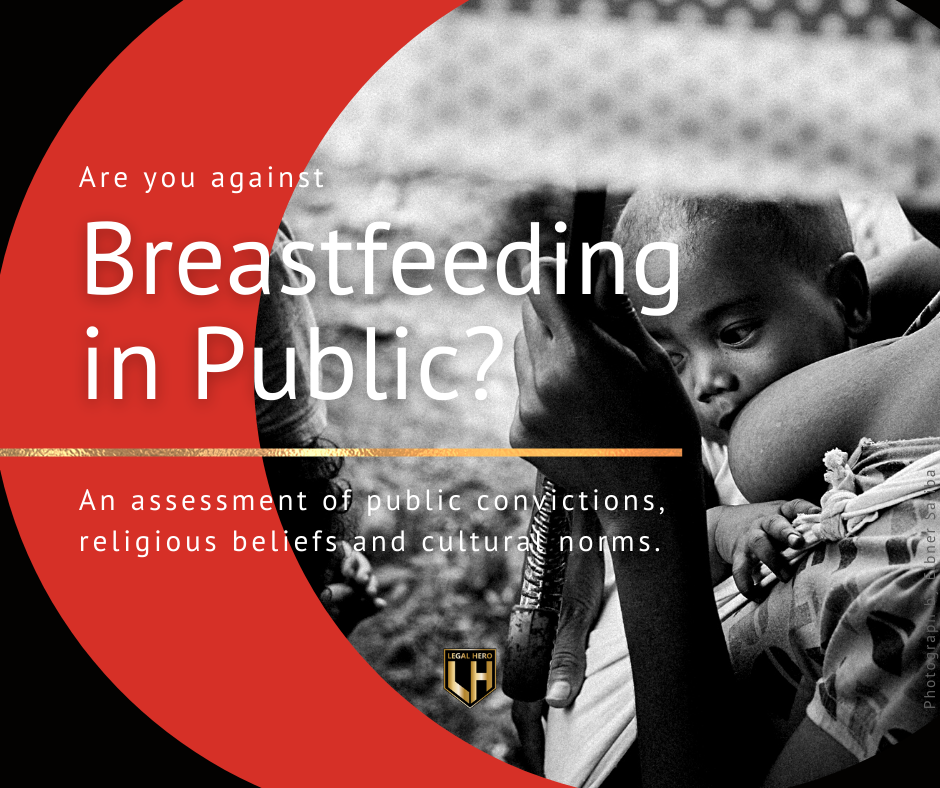
Are you against Breastfeeding in Public?
By Nonhlanhla Mayise (LLB)
Breastfeeding, as endorsed by the World Health Organization (WHO), stands as the optimal nourishment for infants. It boasts a myriad of advantages, including its safety, cleanliness, and the presence of antibodies that bolster immunity against various childhood illnesses. The remarkable nutritional content of breastmilk adequately sustains infants during their early months, providing up to half or more of their dietary requirements during the latter half of the first year, and around one-third during the second year. Moreover, breastfed children tend to exhibit enhanced cognitive performance, a reduced likelihood of becoming overweight or obese, and a diminished susceptibility to diabetes in their later years. For lactating women, the act of breastfeeding is not solely beneficial for their offspring but also offers a lowered risk of breast and ovarian cancers, underlining the manifold advantages it presents.
However, despite the indisputable merits of breastfeeding, a curious societal paradox arises when the act is performed in public spaces. The root of this enigma is multifaceted and draws attention to several thought-provoking aspects.
Sexualization of the Breast
One of the perplexing facets contributing to the discomfort surrounding public breastfeeding is the sexualization of the breast. According to the American Psychological Association, sexualization transpires when individuals are evaluated based on physical attributes and their allure. The breast, designed by nature to nurture and nourish infants, often falls victim to objectification when publicly displayed. This conundrum becomes more pronounced in light of media portrayals, which wield a powerful influence in shaping public perceptions. Consequently, breastfeeding mothers find themselves coerced into concealing their breasts or seeking refuge in inconspicuous corners or public restrooms to feed their infants.
Cultural Norms and Religious Beliefs
The issue is further compounded by cultural norms and religious beliefs that sometimes insist on the privacy of breastfeeding. Though most major religions endorse breastfeeding, their practices may vary in accommodating nursing mothers. Many religious institutions provide secluded spaces or quiet nurseries for mothers to attend to their infants, inadvertently contributing to the perception that breastfeeding should be hidden away. This underscores an unsettling dynamic in which the sanctity of nurturing life is overshadowed by the veiling of a natural bodily function.
A Call for Change
These complexities underscore the sway of public opinion, which over time, has established women’s bodies as subjects of stringent societal standards, driven by legislation and media portrayal. The advent of social media, a platform of potent influence, only exacerbates the issue.
While the South African Constitution of 1996 asserts the right to human dignity and personal agency over one’s body, the instances of unjustifiable limitations on this right persist. The irony lies in the societal inclination to sexualize an organ that serves a primary biological purpose—nurturing and nourishing an innocent life. For mothers, who already grapple with myriad responsibilities, the expectation to sequester themselves in public spaces to care for their children proves an unwarranted burden. Just as one wouldn’t wish to dine under the scrutiny of judgmental gazes, breastfeeding mothers should not be coerced to do so.
In conclusion, it is imperative to reconsider and challenge these societal constructs, redefining the narrative surrounding public breastfeeding. Advocates argue that liberating the breast from its unjustified stigma is a step toward a more equitable and compassionate world, fostering an environment where mothers can nourish their children without inhibition. As our understanding of gender roles and norms continues to evolve, there is hope that public breastfeeding will one day be embraced as a natural and empowering expression of maternal care.
Public Indecency Laws
South African law recognizes that breastfeeding is a natural and essential aspect of motherhood, and thus, laws prohibiting public indecency or obscenity do not typically apply to breastfeeding mothers. However, occasional instances of misunderstanding or societal pressure may lead to discomfort for breastfeeding mothers. It’s crucial for society to further educate itself about the legal rights of breastfeeding mothers and work collectively to create an inclusive and supportive environment for nurturing infants in public.
The NPBSA Movement and Progress in South Africa
In South Africa, the Normalise Public Breastfeeding in SA (NPBSA) movement, has resulted in the formulation of the “Breastfeeding and Related Matters Bill,” a proposed legislation aimed at shielding mothers from public discrimination. Moreover, existing regulations of the Basic Conditions of Employment Act, namely the Code of Good Practice on the Protection of Employees during Pregnancy and after the Birth of a Child have stipulated provisions for breastfeeding employees, ensuring breaks for breastfeeding or expressing milk during working hours. These steps toward fostering a nurturing environment reflect progress, but a broader shift in societal mindset is necessary to empower mothers and normalize breastfeeding as an integral part of life.
The call to “Free the Breast” is more than an anthem—it’s a plea for a more compassionate and equitable society where mothers nurture their children openly and unapologetically.



